-
 Bitcoin
Bitcoin $92,791.8043
-1.35% -
 Ethereum
Ethereum $1,755.1542
-3.41% -
 Tether USDt
Tether USDt $1.0002
-0.01% -
 XRP
XRP $2.1670
-5.40% -
 BNB
BNB $597.8018
-2.59% -
 Solana
Solana $148.6654
-3.10% -
 USDC
USDC $1.0000
0.00% -
 Dogecoin
Dogecoin $0.1741
-5.86% -
 Cardano
Cardano $0.6943
-2.44% -
 TRON
TRON $0.2457
-0.42% -
 Sui
Sui $3.0286
2.61% -
 Chainlink
Chainlink $14.4764
-4.73% -
 Avalanche
Avalanche $22.0152
-4.12% -
 UNUS SED LEO
UNUS SED LEO $9.2234
2.05% -
 Stellar
Stellar $0.2687
-2.01% -
 Toncoin
Toncoin $3.1166
-0.77% -
 Shiba Inu
Shiba Inu $0.0...01320
-3.99% -
 Hedera
Hedera $0.1818
-3.34% -
 Bitcoin Cash
Bitcoin Cash $347.4785
-3.75% -
 Polkadot
Polkadot $4.0211
-3.26% -
 Litecoin
Litecoin $81.4299
-4.20% -
 Hyperliquid
Hyperliquid $17.9559
-5.59% -
 Dai
Dai $1.0000
-0.01% -
 Bitget Token
Bitget Token $4.3936
-4.77% -
 Ethena USDe
Ethena USDe $0.9992
-0.02% -
 Pi
Pi $0.6496
-3.57% -
 Monero
Monero $224.5697
-2.17% -
 Uniswap
Uniswap $5.7648
-4.97% -
 Pepe
Pepe $0.0...08565
-7.33% -
 Aptos
Aptos $5.3125
-1.27%
How to adjust the gas fee to increase transaction speed?
To increase transaction speed on Ethereum, adjust the gas fee higher than the current average using tools like MetaMask or Trust Wallet, balancing cost and urgency.
Apr 24, 2025 at 07:08 pm
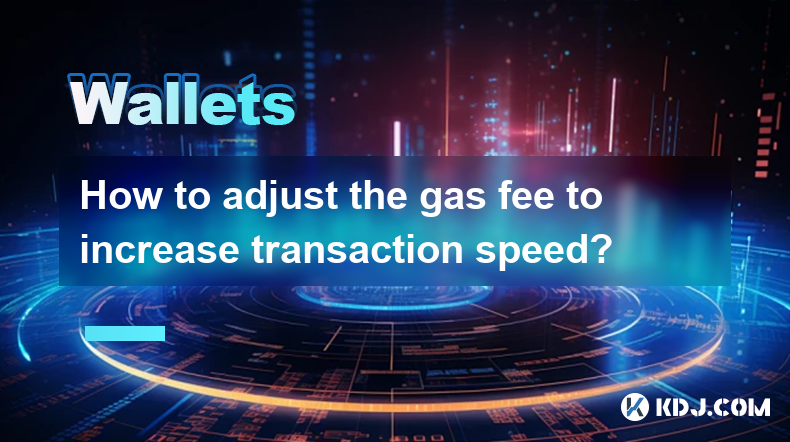
How to Adjust the Gas Fee to Increase Transaction Speed?
When dealing with transactions on the Ethereum network, one of the critical factors that can influence the speed of your transaction is the gas fee. The gas fee is the amount of Ether (ETH) you're willing to pay to have your transaction processed by the network. By adjusting the gas fee, you can either expedite or delay the processing of your transaction. This article will guide you through the process of adjusting the gas fee to increase transaction speed, providing detailed steps and considerations for each method.
Understanding Gas and Gas Fees
Before adjusting the gas fee, it's crucial to understand what gas and gas fees are. Gas is a unit that measures the amount of computational effort required to perform operations on the Ethereum network. Each operation has a specific gas cost, and the total gas used by a transaction determines its gas fee. The gas fee is calculated by multiplying the total gas used by the gas price, which is the amount of ETH you're willing to pay per unit of gas.
To increase transaction speed, you need to increase the gas price, making your transaction more attractive to miners who prioritize transactions with higher fees. However, a higher gas fee also means you'll pay more for the transaction.
How to Check Current Gas Prices
Before setting your gas fee, it's essential to check the current gas prices on the Ethereum network. This will give you a benchmark to work from and help you determine a competitive gas price. Here are the steps to check current gas prices:
- Visit a Gas Tracker Website: Websites like EthGasStation, GasNow, or Etherscan provide real-time data on gas prices. Navigate to one of these sites to see the current average, low, and high gas prices.
- Use a Blockchain Explorer: Platforms like Etherscan also offer gas price data. Go to the "Gas Tracker" section on Etherscan to view the current gas prices.
- Check Your Wallet or DApp: Many Ethereum wallets and decentralized applications (DApps) display current gas prices within their interfaces. Open your wallet or DApp and look for the gas price section.
Adjusting Gas Fees in a Wallet
Most Ethereum wallets allow you to manually adjust the gas fee before sending a transaction. Here's how to do it in some popular wallets:
MetaMask
- Open MetaMask: Launch the MetaMask extension or mobile app.
- Initiate a Transaction: Enter the recipient's address and the amount of ETH you want to send.
- Click on 'Edit' Next to Gas Fee: You'll see options for 'Gas Price' and 'Gas Limit'.
- Adjust the Gas Price: Increase the gas price to a value higher than the current average to expedite your transaction. You can use the gas tracker data to set a competitive price.
- Review and Confirm: Double-check the gas fee and transaction details, then confirm the transaction.
Trust Wallet
- Open Trust Wallet: Launch the Trust Wallet app on your mobile device.
- Send ETH: Tap on the 'Send' button and enter the recipient's address and the amount of ETH.
- Tap on 'Network Fee': You'll see options for 'Gas Price' and 'Gas Limit'.
- Increase the Gas Price: Adjust the gas price to a higher value to speed up the transaction. Use the current gas price data as a reference.
- Confirm the Transaction: Review the details and tap 'Send' to confirm.
Adjusting Gas Fees in a DApp
Some decentralized applications (DApps) allow you to adjust the gas fee directly within their interface. Here's how to do it in a typical DApp:
- Connect Your Wallet: Open the DApp and connect your Ethereum wallet.
- Initiate a Transaction: Navigate to the section where you can send ETH or interact with a smart contract.
- Look for Gas Settings: Many DApps have a section labeled 'Advanced Settings' or 'Gas Settings'.
- Adjust the Gas Price: Increase the gas price to a higher value to prioritize your transaction. Use the current gas price data to set a competitive price.
- Confirm the Transaction: Review the transaction details and confirm to send the transaction.
Considerations When Adjusting Gas Fees
When adjusting the gas fee to increase transaction speed, there are several factors to consider:
- Cost vs. Speed: Higher gas fees will expedite your transaction but at a higher cost. Weigh the urgency of your transaction against the additional cost.
- Network Congestion: During periods of high network congestion, even a high gas fee may not guarantee immediate processing. Monitor the network's current state before setting your gas fee.
- Transaction Type: Different types of transactions (e.g., simple transfers vs. smart contract interactions) may require different gas limits. Ensure you set an appropriate gas limit to avoid transaction failures.
Using Gas Price Oracles
Gas price oracles are services that provide recommended gas prices based on current network conditions. Using a gas price oracle can help you set an optimal gas fee to balance speed and cost. Here's how to use a gas price oracle:
- Choose a Gas Price Oracle: Popular options include EthGasStation, GasNow, and Chainlink's Gas Oracle.
- Integrate the Oracle: If you're a developer, you can integrate the oracle into your DApp to automatically set gas prices. For individual users, you can manually check the oracle's recommendations before setting your gas fee.
- Set the Gas Price: Use the recommended gas price from the oracle to set your transaction's gas fee. This can help ensure your transaction is processed quickly without overpaying.
FAQs
Q: Can I adjust the gas fee after sending a transaction?
A: Once a transaction is sent, you cannot adjust the gas fee. However, some wallets allow you to 'speed up' or 'cancel' a pending transaction by sending a new transaction with a higher gas fee to replace the original one.
Q: What happens if I set the gas fee too low?
A: If you set the gas fee too low, your transaction may take longer to process or may not be processed at all. Miners prioritize transactions with higher fees, so a low gas fee can result in your transaction being stuck in the mempool.
Q: Is there a maximum gas fee I should be aware of?
A: There is no strict maximum gas fee, but setting an excessively high gas fee can result in overpaying for your transaction. It's best to use gas price data and oracles to set a competitive yet reasonable gas fee.
Q: Can I use the same gas fee for all types of transactions?
A: No, different types of transactions may require different gas limits and fees. Simple ETH transfers typically require less gas than complex smart contract interactions. Always check the recommended gas limit and price for the specific transaction you're making.
Disclaimer:info@kdj.com
The information provided is not trading advice. kdj.com does not assume any responsibility for any investments made based on the information provided in this article. Cryptocurrencies are highly volatile and it is highly recommended that you invest with caution after thorough research!
If you believe that the content used on this website infringes your copyright, please contact us immediately (info@kdj.com) and we will delete it promptly.
- After Years of "PUA", Zora Finally Issued a Coin, but the Community Users Did Not Get the "Big Result" They Wished For
- 2025-04-24 21:20:11
- Bitcoin (BTC) Has Exceeded the Realized Price of Short-term Holders, Exciting Analysts
- 2025-04-24 21:20:11
- PEPE Price Surge Re-enters the Crypto Spotlight with a 17% Breakout
- 2025-04-24 21:15:12
- US President Donald Trump Signed an AI Executive Order
- 2025-04-24 21:15:12
- Spot Bitcoin ETF inflows are at their highest since January 2025.
- 2025-04-24 21:10:12
- Mantle Network Launches MI4, a Institutional-Grade Digital Asset Index Fund Targeting $400M Market Gap
- 2025-04-24 21:10:12
Related knowledge
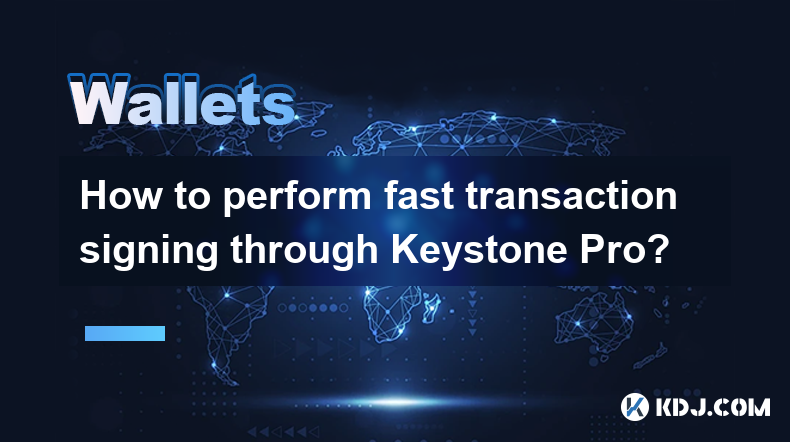
How to perform fast transaction signing through Keystone Pro?
Apr 24,2025 at 09:50pm
Introduction to Keystone ProKeystone Pro is a highly secure and user-friendly hardware wallet designed specifically for cryptocurrency enthusiasts who value both security and efficiency. One of its standout features is the ability to perform fast transaction signing, which is crucial for users who need to execute transactions quickly and securely. In th...
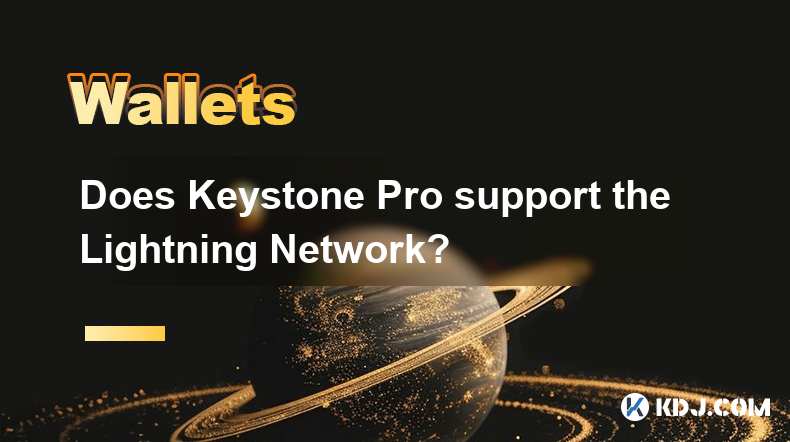
Does Keystone Pro support the Lightning Network?
Apr 24,2025 at 08:56pm
Introduction to Keystone ProKeystone Pro is a hardware wallet designed to provide secure storage for various cryptocurrencies. It emphasizes user-friendly design and robust security features, making it an appealing choice for both beginners and experienced users in the crypto space. One of the frequently asked questions about Keystone Pro is whether it ...
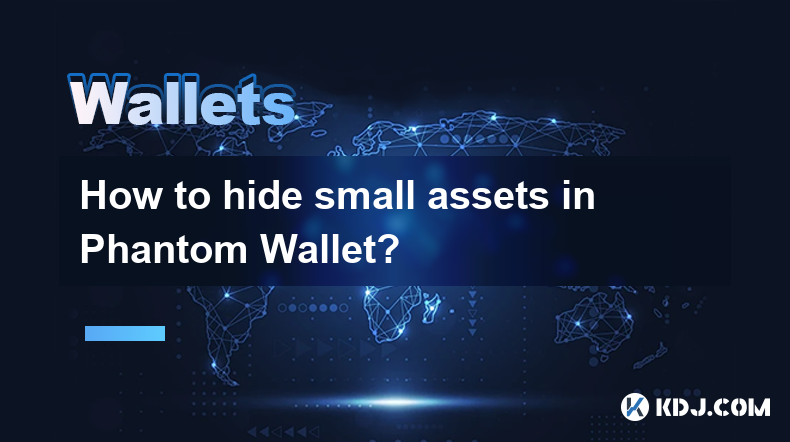
How to hide small assets in Phantom Wallet?
Apr 24,2025 at 05:22pm
Introduction to Phantom WalletPhantom Wallet is a popular non-custodial wallet designed specifically for Solana (SOL) and other cryptocurrencies. It allows users to manage their assets securely and interact with decentralized applications (dApps) seamlessly. One of the features users often seek is the ability to hide small assets within the wallet to ma...

How to adjust the gas fee to increase transaction speed?
Apr 24,2025 at 07:08pm
How to Adjust the Gas Fee to Increase Transaction Speed?When dealing with transactions on the Ethereum network, one of the critical factors that can influence the speed of your transaction is the gas fee. The gas fee is the amount of Ether (ETH) you're willing to pay to have your transaction processed by the network. By adjusting the gas fee, you can ei...
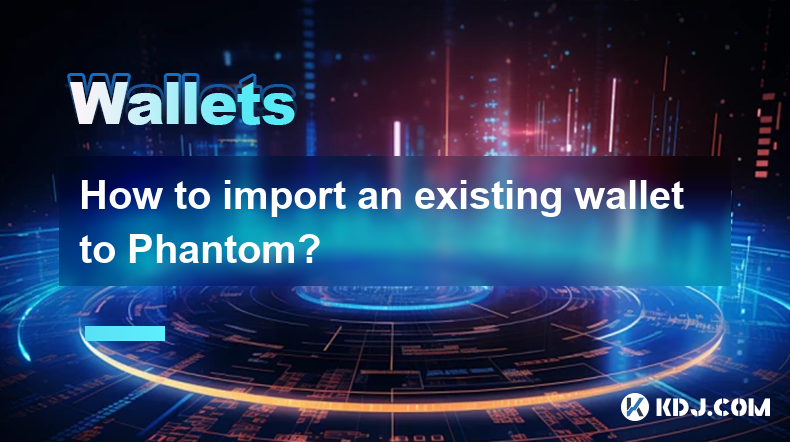
How to import an existing wallet to Phantom?
Apr 24,2025 at 06:35pm
Introduction to Phantom WalletPhantom is a popular non-custodial wallet that supports multiple blockchains, including Solana, Ethereum, and Polygon. It allows users to manage their cryptocurrencies, NFTs, and decentralized applications (dApps) securely. One of the key features of Phantom is the ability to import existing wallets, which makes it easier f...
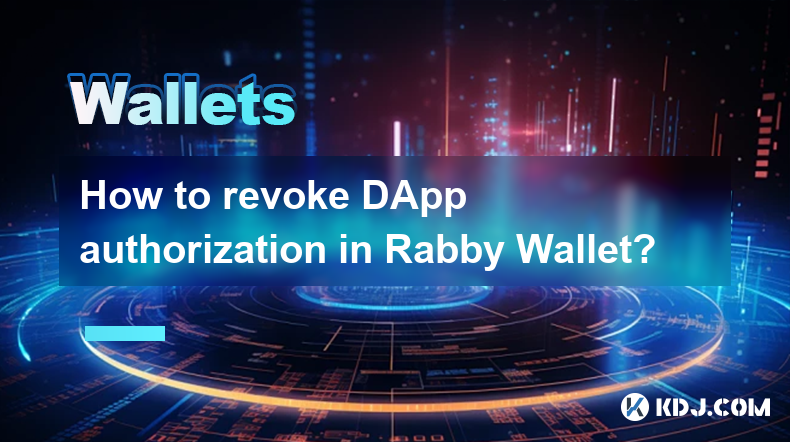
How to revoke DApp authorization in Rabby Wallet?
Apr 24,2025 at 08:42pm
Introduction to Rabby Wallet and DApp AuthorizationRabby Wallet is a versatile and user-friendly cryptocurrency wallet that allows users to interact with various decentralized applications (DApps) on different blockchain networks. One of the essential features of Rabby Wallet is the ability to authorize and manage permissions for these DApps. However, i...

How to perform fast transaction signing through Keystone Pro?
Apr 24,2025 at 09:50pm
Introduction to Keystone ProKeystone Pro is a highly secure and user-friendly hardware wallet designed specifically for cryptocurrency enthusiasts who value both security and efficiency. One of its standout features is the ability to perform fast transaction signing, which is crucial for users who need to execute transactions quickly and securely. In th...

Does Keystone Pro support the Lightning Network?
Apr 24,2025 at 08:56pm
Introduction to Keystone ProKeystone Pro is a hardware wallet designed to provide secure storage for various cryptocurrencies. It emphasizes user-friendly design and robust security features, making it an appealing choice for both beginners and experienced users in the crypto space. One of the frequently asked questions about Keystone Pro is whether it ...

How to hide small assets in Phantom Wallet?
Apr 24,2025 at 05:22pm
Introduction to Phantom WalletPhantom Wallet is a popular non-custodial wallet designed specifically for Solana (SOL) and other cryptocurrencies. It allows users to manage their assets securely and interact with decentralized applications (dApps) seamlessly. One of the features users often seek is the ability to hide small assets within the wallet to ma...

How to adjust the gas fee to increase transaction speed?
Apr 24,2025 at 07:08pm
How to Adjust the Gas Fee to Increase Transaction Speed?When dealing with transactions on the Ethereum network, one of the critical factors that can influence the speed of your transaction is the gas fee. The gas fee is the amount of Ether (ETH) you're willing to pay to have your transaction processed by the network. By adjusting the gas fee, you can ei...

How to import an existing wallet to Phantom?
Apr 24,2025 at 06:35pm
Introduction to Phantom WalletPhantom is a popular non-custodial wallet that supports multiple blockchains, including Solana, Ethereum, and Polygon. It allows users to manage their cryptocurrencies, NFTs, and decentralized applications (dApps) securely. One of the key features of Phantom is the ability to import existing wallets, which makes it easier f...

How to revoke DApp authorization in Rabby Wallet?
Apr 24,2025 at 08:42pm
Introduction to Rabby Wallet and DApp AuthorizationRabby Wallet is a versatile and user-friendly cryptocurrency wallet that allows users to interact with various decentralized applications (DApps) on different blockchain networks. One of the essential features of Rabby Wallet is the ability to authorize and manage permissions for these DApps. However, i...
See all articles























































































